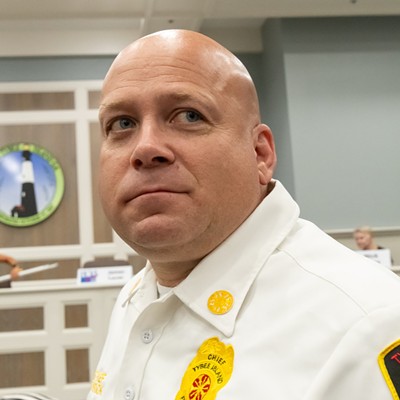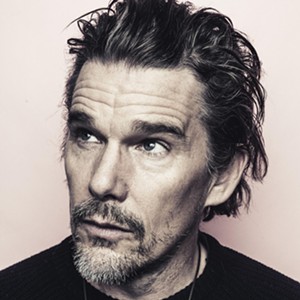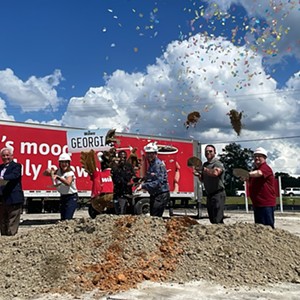Most of us lead busy lives and donít have the luxury of closely following classical music.
But whether youíre an aficionado or not, one thing you should know is that having Daniel Hope serve as associate artistic director of the Savannah Music Festival is a big, big deal.
Itís like Kobe Bryant running a basketball camp at the Islands YMCA, or George Clooney managing the Savannah Film Festival or Kanye West organizing an open-mic night at the Sentient Bean.
Really -- itís that big a deal. He may move in smaller circles, but Daniel Hope is just as hot and in-demand in his field as the above-mentioned names are in theirs.
The youngest-ever member of the renowned Beaux Arts Trio, with whom he tours often, the violinist received two Grammy nominations in 2005.
As a musician, Hope breathes new life into old standards. As a prolific and award-winning composer, he combines deep respect for form with an almost childlike whimsy -- as well as daring to bring new works into some often staid environments.
Since Executive & Artistic Director Rob Gibson brought Hope onboard in 2004, the Savannah Music Festival has become a major playground for this gifted artist. Indeed, many of his works have seen their world premieres at the festival.
Hope specializes in conceptual, collaborative efforts with other performers. These works often combine words with music, such as ìWar and PiecesÎ and ìMozart Unplugged!Î with Oscar-winning actor Klaus Maria Brandauer; ìAn Audience with BeethovenÎ with Mia Farrow; ìForbidden Not ForgottenÎ with chamber music and poetry from the Theresienstadt Ghetto; and ìMusic To Die For!Î, a play written by his father, prize-winning novelist Christopher Hope, who was an early critic of apartheid in Danielís native country of South Africa.
Despite his comparatively young age of 32, Hope has deep roots. After appearing on British TV playing Shostakovich at age ten, Hope was invited by the violin legend Yehudi Menuhin to perform on German TV. It was the beginning of a long association with the great Menuhin. Hopeís homage to his mentor was the award-winning 2004 CD East meets West, a collaboration with sitarist Gaurav Mazumdar in the mode of Menuhinís own historic collaboration with Ravi Shankar in the Ë60s.
We spoke to Hope by cellphone, as he waited in LAX for a flight taking him to yet another concert.
Connect Savannah: First off, I have to ask if many classical musicians have the same incredibly hectic touring schedule you do.
Daniel Hope: Some of us do, some don't. But itís certainly been pretty crazy these days. Itís been wonderfully diverse. There are so many different types of things going on, different styles, whether it be world music or other forms. Life is certainly not boring.
Connect Savannah: Iím intrigued by the symbiosis youíve been able to achieve with the Savannah Music Festival. In addition to performing your work and the work of others at the festival, you also have a key management role. How does all that work, exactly?
Daniel Hope: One is thrilled but at the same time terrified! I have the privilege this year of playing with Edgar Meyer and with his colleagues. For me theyíre some of the greatest musicians on the planet, and itís an incredible opportunity to take part and work with these guys. I have such an incredible respect for the music they do, and also who they are and how they play. Iím thrilled with the way these guys perform together and that they agreed to let me come on board for just a few numbers. Edgar Meyer has the most versatile, brilliant mind. And the music is new to me. Iíve known the music, but never played it before. So Iíve been studying now for weeks and months.
Then thereís The Soldier's Tale program -- itís so much a human tale of morality, like all the old fables. Iím thrilled we have one of most exciting young stage directors, Jonathan Moore, whoís done many things with the Royal Shakespeare Company and opera houses across Europe. Itís music theatre, I guess you'd call it. Itís a tremendous challenge. Itís full of jazz, ragtime, a most incredible range of music.
Connect Savannah: How do you plan and manage the festivalís mix of musical styles?
Daniel Hope: Well, we have the great fortune of Rob Gibson's experience in jazz. The jazz word is his oyster, and heís got fantastic connections there. And of course Iím lucky enough in the classical world to have a lot of world-wide contacts because I travel so much.
We have all these radical brainstorms and thrash out ideas together. But all that is useless unless you have an audience who can take it in. We need the audience just as much as we need the music. Thatís part of whether these projects succeed. That's what Savannah's about
Connect Savannah: Tell us more about how you and Rob initially got together to work on the festival.
Daniel Hope: Rob contacted me first. I got an e-mail from him -- I guess this was late 2003 or early 2004. Rob had been to a concert of mine in Atlanta and I guess he liked it. He said he was leaving the Lincoln Center in New York and going back to Savannah and creating a new festival. He asked if I would come help on the classical side. I was intrigued by the way he wrote the e-mail. So I called him and we had conversation and basically hit it off straight away on the phone. I got the real sense that here was someone really worth talking to.
So I came in to do concerts in 2004 as more of an artist-in-residence. It was a trial for me, and a trial for the audience to see how we got on with each other. It was an unusual way to start.
With ìAn Audience With Beethoven,Î for example, we wrote the script for that, and there was a cancellation. Mia Farrow was able to get here on short notice. That says a lot about this festival -- that we were able to pull off that sort of spontaneous coming-together of two different worlds.
That first year I did a number of concerts in that role as artist-in-residence. And in, 2005 Rob asked me to take on more formal role.
Connect Savannah: Describe for us the progress of the Festival since you first came onboard in 2004.
Daniel Hope: Itís really grown from the last two years, in the kinds of things we've been doing and the risks weíve been taking. You never know if itís going to work or gel. There can be the most exciting results that stem from that. Weíre always looking for fascinating projects to challenge the audience. Iím thrilled to see the reaction from Savannah audiences, how open they are, and how willing to listen to new styles.
Weíve got a long way to go. But itís amazing whatís been accomplished so far, in the profile of the festival. So many people all over the world are starting to write about it and talk about it. Now weíre at a point of seeing what are the things that work and what are the things we'd like to do better. But overall Iíd have to say that participating in the festival is as exciting as the first time, and my intentions are to keep doing it.
Connect Savannah: Where do you see the festival in five years?
Daniel Hope: We want to keep it, in a sense, small. Not ìsmallÎ by any measurement, but in producing very high quality in a limited period of time. That's extremely important as far as I'm concerned. I just don't see it turning into some gigantic festival. I see it as cutting-edge, providing world-class music, dance, drama, and fine arts across the board. Producing crossover that matters, crossover with quality -- not things thrown together. You need real quality to ignite the audience. And Iím happy with the way it's sort of slowly consolidating.
Connect Savannah: You mention dance. Many people say they want the Savannah Music Festival to feature more dance.
Daniel Hope: Personally I would love to see more dance at the festival. Itís a question of the right venue. I for one would love doing it, but Iím not 100 percent convinced we have the right venue for dance. There are so many great venues and alternative venues -- and alternative venuing is important. Itís important to get people out and into venues they wouldnít necessarily associate with the concept. All of that helps the festival, and Iíd love to see dance come in a big way. Itís a fundamental part of art and music.
Then of course, itís always about planning and how many openings we have and the budget and so forth. Luckily, thatís not my department -- itís Robís headache (laughs). I get to just work on the creative side.
Connect Savannah: How much of a role has the Savannah Music Festivalís location played in its success?
Daniel Hope: Iíve played in literally hundreds of festivals all over the world. Iíve seen some wonderful festivals, major festivals from Salzburg to Ravinia. And I have to say somethingís completely unique in Savannah. To have such a mixture of styles at such a high level is pretty much unique. Iíd like to see that transport, but it will take some time. Word of mouth is spreading and weíre getting feedback. Iíd say the next five years is crucial to get that word out.
Savannah has become a very special place for me. When Rob contacted me, I didn't know much about Savannah apart from that sort of Gone With the Wind thing and Midnight in the Garden of Good and Evil. But now Iíve spent a lot of time there and itís taken on a very special place for me. Iím very happy to be a part of something in that location. Itís a very unique town, and you have something very special in this festival.
In addition to his role as assistant artistic director, Daniel Hope performs in the Savannah Music Festival in the following ensemble concerts:
March 22, 5:30 & 7:30 p.m., Telfair -- Beethoven: Piano Quartet in E-flat Major; De Falla: Seven Popular Spanish Folk Songs for Violin and Guitar; Piano Quintet in A Major, Op. 81
March 26, 5:30 & 7:30 p.m., Telfair --
Mozart: String Quintet in C Major, K515
Brahms: String Quintet No. 2 in G Major, Op. 111
March 28, 5:30 & 7:30 p.m., Telfair --
Schubert: Auf dem Strom
Schubert: Octet, D803
March 31, 7:30 p.m., Lucas Theatre --
Sam Bush, Mike Marshall, Edgar Meyer with special guest Daniel Hope
April 1, 7:30 p.m., Telfair --
Katia and Marielle Labeque, Daniel Hope and Friends
April 2, 3 p.m., Lucas Theatre --
Stravinsky: L'histoire du Soldat (The Soldier's Tale), Jonathan Moore, Director
For tickets and schedule, go to
www.savannahmusicfestival.org




























